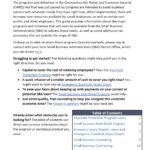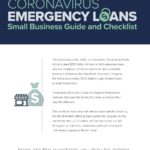The programs and initiatives in the Coronavirus Aid, Relief, and Economic Security (CARES) Act that was just passed by Congress are intended to assist business owners with whatever needs they have right now.
When implemented, there will be many new resources available for small businesses, as well as certain nonprofits and other employers. This guide provides information about the major programs and initiatives that will soon be available from the Small Business Administration (SBA) to address these needs, as well as some additional tax provisions that are outside the scope of SBA.
To keep up to date on when these programs become available, please stay in contact with your local Small Business Administration (SBA) District Office, which you can locate here.
Struggling to get started? The following questions might help point you in the right direction. Do you need:
- Capital to cover the cost of retaining employees? Then the Paycheck Protection Program might be right for you.
- A quick infusion of a smaller amount of cash to cover you right now? You might want to look into an Emergency Economic Injury Grant.
- To ease your fears about keeping up with payments on your current or potential SBA loan? The Small Business Debt Relief Program could help.
- Just some quality, free counseling to help you navigate this uncertain economic time? The resource partners might be your best bet.

For more: Download the complete “The-Small-Business-Owners-Guide-to-the-CARES-Act”
How Does the CARES Act Address Small Business Loans?
The CARES Act is the largest economic stimulus measure in modern history and promises to provide help for struggling American families and businesses. Specifically, the Act includes the
following provisions:
- The Act includes nearly $350 billion for a federal small business loan program called the Paycheck Protection Program. The program is designed to get cash in the hands of suffering small businesses quickly, with less stringent eligibility requirements than the existing U.S. Small Business Association (SBA) loan programs. Paycheck Protection Program loans are designed to incentivize business owners to keep employees on payroll.
- In addition to businesses already eligible for SBA programs, most businesses with 500 or fewer employees are now eligible for disaster loans of up to $2 million for working capital. Those businesses will also be eligible for an emergency cash advance of $10,000 within days of making the application, which is not repayable even if their loan application is denied.
Overview of CARES Act Small Business Loan Provisions
As noted above, the CARES Act provides two main avenues for obtaining a business loan:
- Through the Paycheck Protection Program
- Through the SBA as a disaster loan
Here are the questions you may be asking and what you need to know.
1. Am I ELIGIBLE?
You are eligible if you are:
- A small business with fewer than 500 employees
- A small business that otherwise meets the SBA’s size standard
- A 501(c)(3) with fewer than 500 employees
- An individual who operates as a sole proprietor
- An individual who operates as an independent contractor
- An individual who is self-employed who regularly carries on any trade or business
- A Tribal business concern that meets the SBA size standard
- A 501(c)(19) Veterans Organization that meets the SBA size standard
In addition, some special rules may make you eligible:
- If you are in the accommodation and food services sector (NAICS 72), the 500-employee rule is applied on a per physical location basis
- If you are operating as a franchise or receive financial assistance from an approved Small Business Investment Company the normal affiliation rules do not apply
REMEMBER: The 500-employee threshold includes all employees: full-time, part-time, and any other status.
2. What will lenders be LOOKING FOR?
In evaluating eligibility, lenders are directed to consider whether the borrower was in operation before February 15, 2020 and had employees for whom they paid salaries and payroll taxes or paid independent contractors.
Lenders will also ask you for a good faith certification that:
- The uncertainty of current economic conditions makes the loan request necessary to support ongoing operations
- The borrower will use the loan proceeds to retain workers and maintain payroll or make mortgage, lease, and utility payments
- Borrower does not have an application pending for a loan duplicative of the purpose and amounts applied for here
- From Feb. 15, 2020 to Dec. 31, 2020, the borrower has not received a loan duplicative of the purpose and amounts applied for here (Note: There is an opportunity to fold emergency loans made between Jan. 31, 2020 and the date this loan program becomes available into a new loan)
If you are an independent contractor, sole proprietor, or self-employed individual, lenders will also be looking for certain documents
(final requirements will be announced by the government) such as payroll tax filings, Forms 1099-MISC, and income and expenses from the sole proprietorship.
What lenders will NOT LOOK FOR
- That the borrower sought and was unable to obtain credit elsewhere.
- A personal guarantee is not required for the loan.
- No collateral is required for the loan

For more: Download the complete “US Chamber of Commerce – SBA Checklist”

